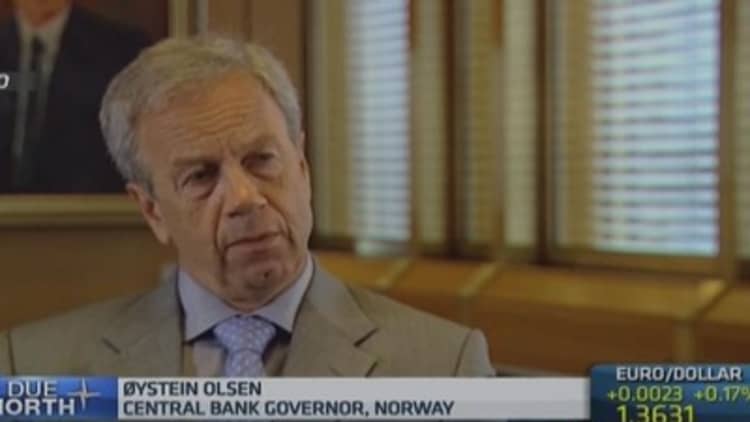
Norway's robust economy is at risk from declining energy investment, Norway's central bank governor told CNBC this week.
"At some point in the future, oil investments will come down from the present very high level and when that happens—and it will happen at some point—that will create big challenges for the Norwegian economy," said Øystein Olsen, who has headed the Norges Bank since 2011.
"There will be a need for a transition in the economy, in the opposite direction, away from oil."
Norway is the world's third-largest exporter of natural gas and the seventh-largest oil exporter. It proved one of the best-performing economies during the European sovereign debt crisis, but now, non-oil exporters are struggling and the government is set to increase its spending—which means dipping into its oil revenue.
On Thursday, the central bank forecast that investment in the petroleum industry would decline 10 percent in 2015, before flattening in 2016 and rising modestly in 2017.
It attributed its bearish outlook to the postponement of a number of investment projects in recent months, because of high costs in the sector, and prospects for somewhat lower oil and gas prices.
"The Norwegian economy has benefited from the high oil price, high oil revenues and the fact that the petroleum industry is an enormous engine in our economy. If that changes, the situation is completely different," Olsen told CNBC.
He added that the weak sector outlook partly explained why the central bank had cuts its interest rate guidance on Thursday.
Norges Bank kept its key policy rate unchanged at 1.5 percent, where it has been held since March 2012. However, it surprised markets by pushing back its deadline for a rate rise to the end of 2015, instead of summer next year.
It also warned that it could cut the rate further if Norway's economic outlook declined, and that growth might prove weaker than previously expected.
After the central bank's unexpectedly dovish statement, the Norwegian krone dived to a two-month low of 8.31 against the euro.
Read MoreTrack the Norwegian krone live
"If you take the near-future, 2015, what we estimate is that in that year, we will have instead of zero growth, we will have negative growth in the range of 10 percent," said Olsen.
"That is amajor negative stimulus in the overall demand, and that explains to some extent, that contributes to the lowering of our interest rate path."
In a statement explaining its decision, Norges Bank added that the "moderate economic upswing" among Norway's trading partners was continuing, but that there was little prospect of them raising their own rates soon.
Jacqui Douglas of TD Securities said the central bank's announcement was based largely on trying to control the exchange rate.
"We think that the bigger factor for the Norges Bank, even if it didn't come out this way quantitatively, was the lower rates abroad, and the fear that wider rate differentials would lead to further Norwegian krone appreciation," the foreign exchange strategist wrote in a research note.
Olsen denied the central bank was targeting the krone.
"We do not target krone developments," he told CNBC. "We now have a flexible inflation-targeting regime, so we focus on keeping inflation low and stable."
—By CNBC's Katy Barnato

